Key takeaways:
- Economic inequality highlights the disparity in wealth distribution, impacting people’s lives and choices.
- Reparations are seen as a vital means to address historical injustices, potentially transforming community dynamics through investment rather than just financial compensation.
- Historical contexts of reparations reveal patterns of resistance and highlight the importance of acknowledging past wrongs for meaningful change.
- Practical steps to address inequality include community investment funds, enhanced access to education, and equitable tax reforms.
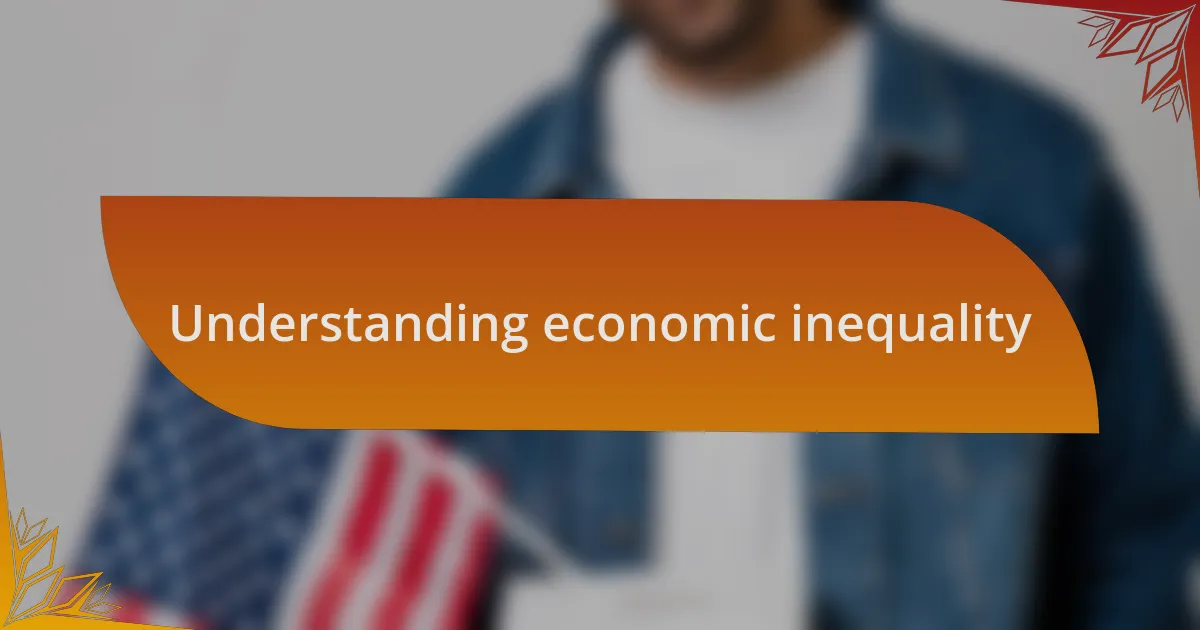
Understanding economic inequality
Economic inequality refers to the uneven distribution of resources and wealth within a society. I often think about how, while some individuals accumulate vast fortunes, others struggle to meet basic needs. It’s a stark reminder that our economic landscape is not just numbers; it’s about real lives and the choices people make—or are forced to make—every day.
Reflecting on my own experiences, I remember a time when I volunteered at a local food bank. Witnessing families come in, filled with hope yet burdened by financial strain, really illustrated to me the depths of economic disparity. It makes you question how a society can thrive when so many are left behind. How can we claim to progress when a significant portion of our population faces systemic barriers that inhibit their economic mobility?
As I delve deeper into this topic, I can’t help but wonder: what narratives are we missing by not addressing economic inequality more directly? Each person’s story, filled with their struggles and hopes, adds a layer to our understanding of the issue. The complexities of economic inequality aren’t just statistics; they are woven into the very fabric of our communities and demand our attention and action.
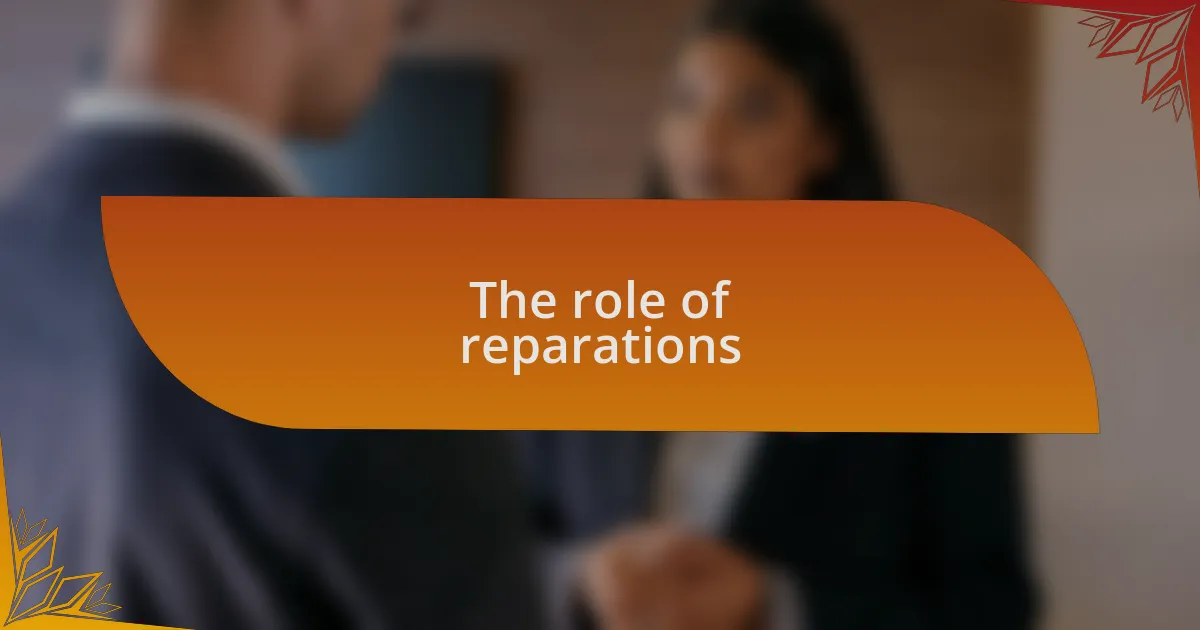
The role of reparations
The role of reparations is often envisioned as a critical mechanism to address historical injustices and economic disparities. I recall discussing this concept with a friend who felt that reparations could serve as a bridge to rectify past wrongs, fostering a sense of responsibility and justice. It’s essential to consider whether these reparative actions can truly transform the dynamics of wealth in our society or if they risk becoming merely symbolic.
I remember a conversation where we explored the potential impacts of reparations in a local community. The idea was not just about financial compensation, but about investing in education, healthcare, and community development. Can reparations lay the groundwork for a more equitable future? From my perspective, providing resources for vulnerable communities can create pathways to break the cycles of poverty and inequality that have persisted for generations.
Ultimately, the implementation of reparations might serve as a powerful statement of commitment to equality. Every story of someone affected by economic disparity brings us one step closer to understanding the necessity of reparations. How can we move forward without acknowledging the past? In my experience, recognizing and addressing these historical injustices can inspire meaningful change, creating a shared framework for a more just society.
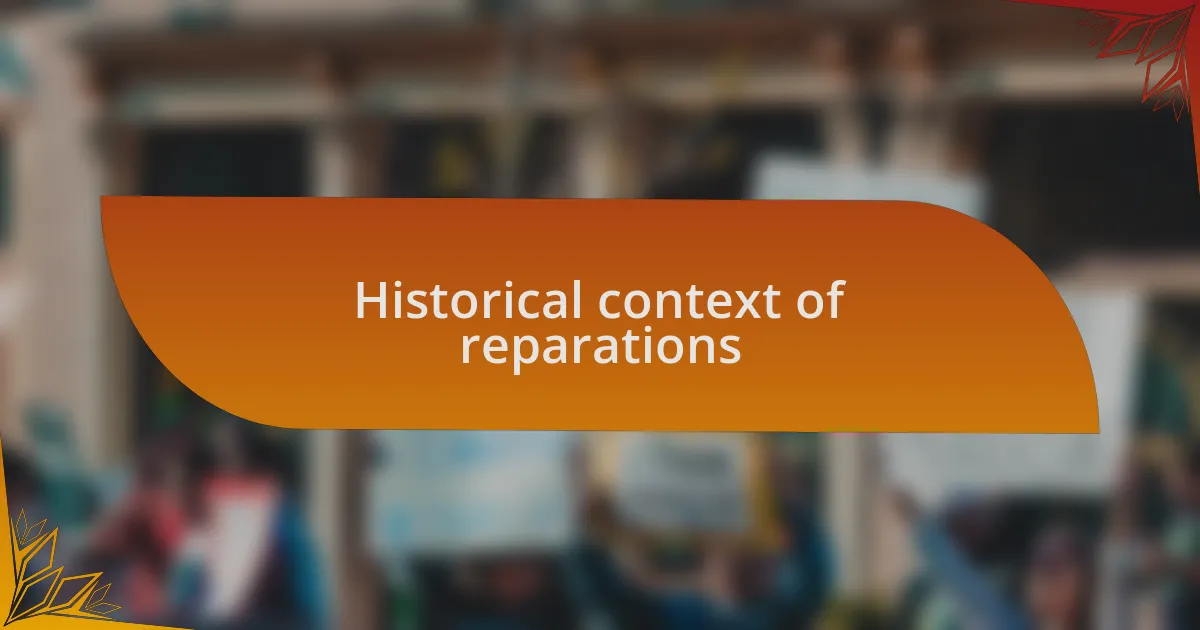
Historical context of reparations
The concept of reparations has deep historical roots, particularly in the aftermath of slavery and colonialism. I often think about the indelible scars left on society; the legacy of exploitation still resonates. For example, discussions around reparations for African Americans remind me of my own family history, where my ancestors endured systemic barriers that have lingering effects on generations. How can we ignore the chain of disadvantage that spans centuries?
Throughout history, various movements have emerged advocating for reparations, from the Freedmen’s Bureau after the Civil War to contemporary calls for justice. I remember reading about the compensation offered to Japanese Americans interned during World War II. It struck me as a recognition of wrongdoing, and it makes me wonder—if we could rectify that injustice, why has it taken so long to confront other historical wrongs? The importance of acknowledging these past injustices cannot be overstated, as it lays the groundwork for meaningful reparative measures.
When exploring the historical context of reparations, we see a recurring theme of resistance and denial. Reflecting on the establishment of reparations discussions worldwide, such as in Germany for Holocaust survivors, I can’t help but feel a sense of hope and frustration. How can societies fully embrace reparative justice without engaging deeply with their past? In my viewpoint, grappling with these difficult histories is essential for fostering an atmosphere conducive to healing and reconciliation.
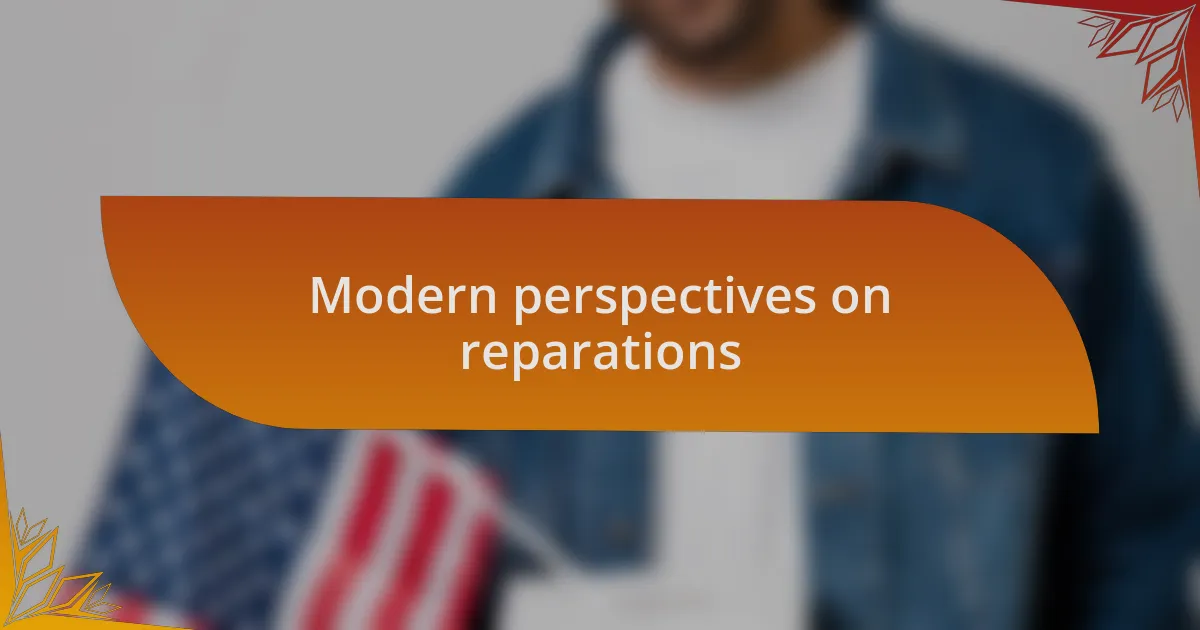
Modern perspectives on reparations
When thinking about modern perspectives on reparations, I often find myself reflecting on the increasing public discourse surrounding the topic. Social movements today are not just reciting historical grievances; they’re demanding concrete action. I remember joining a local discussion group where one member passionately argued that reparations could serve as a catalyst for addressing systemic economic inequality, sparking a lively debate about what justice should look like in the 21st century.
It’s fascinating to observe how technology plays a role in shaping these conversations. With the rise of social media, stories of personal hardship and historical injustice can reach wider audiences faster than ever before. I think about how one tweet can ignite a nationwide conversation, making the issue of reparations more accessible and relatable to younger generations. But I often wonder, is this visibility enough to create meaningful change, or are we merely scratching the surface of a much deeper issue?
As policymakers consider reparations, there’s a tension between models of direct payment versus investment in community resources. I recently read proposals suggesting that funding could go towards education, healthcare, and housing for marginalized communities. This thought resonates with me; rather than just compensating individuals, what if we focused on building structures that ensure long-term equity? How can we reimagine reparations not just as a one-time payout, but as a transformative investment in a more just society?
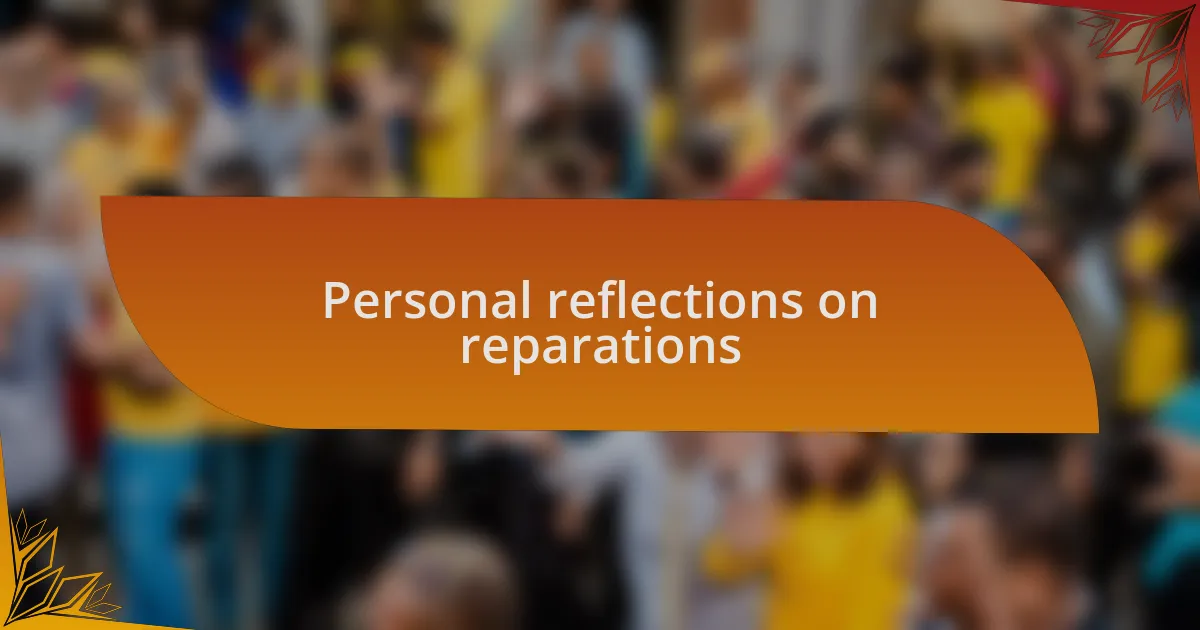
Personal reflections on reparations
As I ponder the concept of reparations, I often think back to conversations I’ve had with friends who come from different backgrounds. One evening, a close friend shared how their family’s history of systemic disenfranchisement shaped their opportunities in life. Hearing these stories firsthand made me question how often we truly listen to each other’s experiences. Could reparations be not just a financial remedy but also a chance for deeper understanding and healing?
Reflecting on my participation in community forums, I realize how vital storytelling is in the reparations debate. During one session, a participant shared their family’s journey through housing discrimination and the generational wealth gap it created. The raw emotion in their voice struck a chord with me. I couldn’t help but ask myself, how can we measure justice for those who have suffered enduring inequities? It reinforced my belief that reparations should acknowledge these personal narratives, giving voice to the untold struggles of marginalized communities.
I often wonder about the long-term implications of reparations on society as a whole. If reparations are implemented effectively, could they not only serve as restitution but also as a tool for bridging societal divides? My thoughts drift to the possibility of creating a shared future where we value equity over inequality. It makes me hopeful yet cautious, as the path to achieving this balance feels fraught with challenges and uncertainties. How do we ensure that this movement evolves into something truly transformative, rather than a fleeting moment in the political landscape?
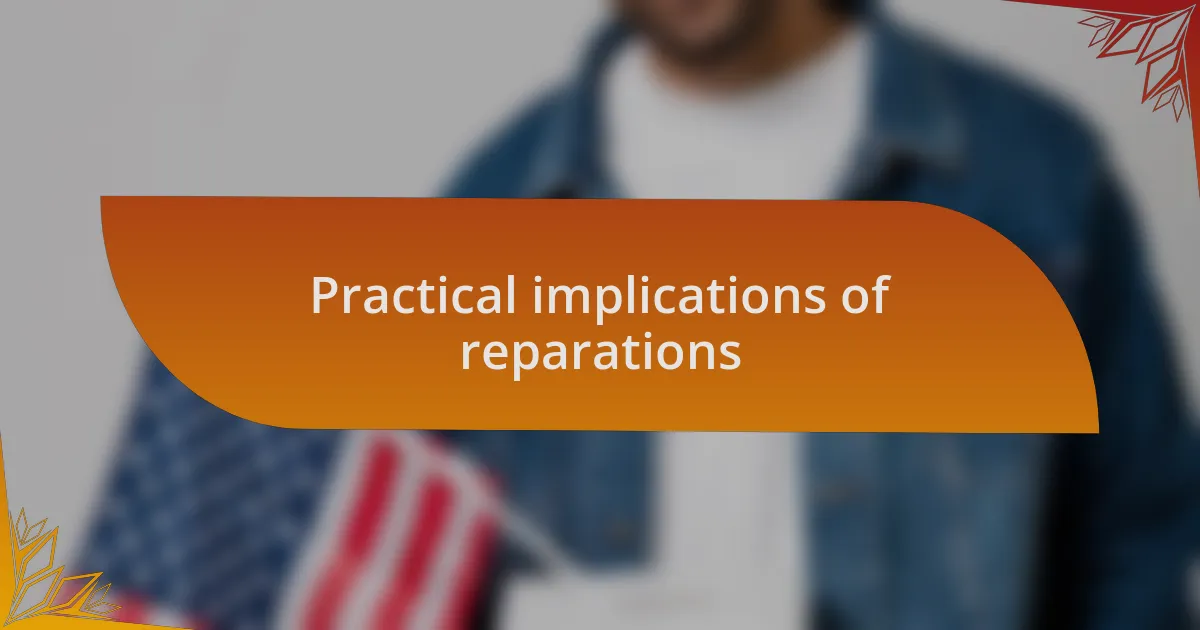
Practical implications of reparations
Reparations, at their core, represent a significant shift in how we address historical injustices. From my experience in community discussions, I’ve seen how effective reparations can catalyze economic growth in marginalized neighborhoods. It’s intriguing to consider: what if the financial support provided through reparations is not only a stepping stone to equity but also an investment in community rebuilding?
Delving deeper, I believe that reparations might encourage local businesses to flourish, driven by increased capital circulation. I recall a local initiative where recent funding brought new life to storefronts that had long been neglected. Witnessing families regain economic footing makes me think—how many more communities could thrive with a similar framework in place? This illustrates the dynamic potential of reparations as more than compensation; they could spark real revitalization.
However, I often wrestle with the question of implementation. Who gets to decide the terms of reparations, and how do we ensure fairness in distribution? Engaging with these issues can feel overwhelming, yet it’s essential for creating a system that not only acknowledges past grievances but also fosters progress. I believe it requires transparency and ongoing dialogue among stakeholders, setting the stage for a future where justice and opportunity can coexist.
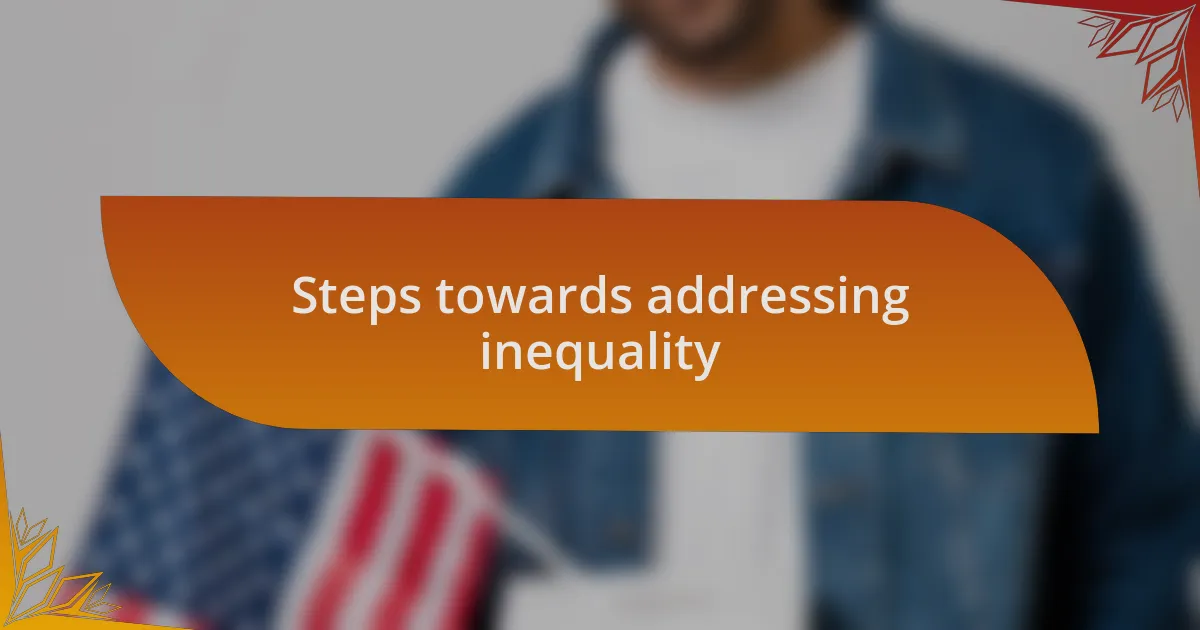
Steps towards addressing inequality
One practical step towards addressing economic inequality is the establishment of community-based investment funds. I recall a project in my neighborhood where a group of residents pooled their resources to create a fund aimed at supporting local entrepreneurs. The excitement was palpable as we watched new businesses take root and contribute to the community’s overall vitality. It’s fascinating to think about how similar initiatives across the nation could empower countless individuals, fostering independence and economic growth.
Another important measure is enhancing access to quality education and job training programs. I’ve seen firsthand how educational opportunities can drastically alter life trajectories. One friend’s journey from a struggling background to a thriving tech career began with access to a specialized coding boot camp. Isn’t it uplifting to consider how investing in education could not only uplift individuals but also dismantle systemic barriers?
Lastly, policy reform aimed at equitable tax structures can play a pivotal role in addressing inequality. From my perspective, advocating for a tax system that redistributes wealth more effectively might seem daunting, but it’s a necessary dialogue. As I think back to discussions I’ve engaged in about fairness in taxation, I see a significant opportunity for creating a society where everyone contributes to the common good, reducing the disparity that has persisted for generations. How can we push for changes that ensure our economic systems reflect our values of equality and justice?